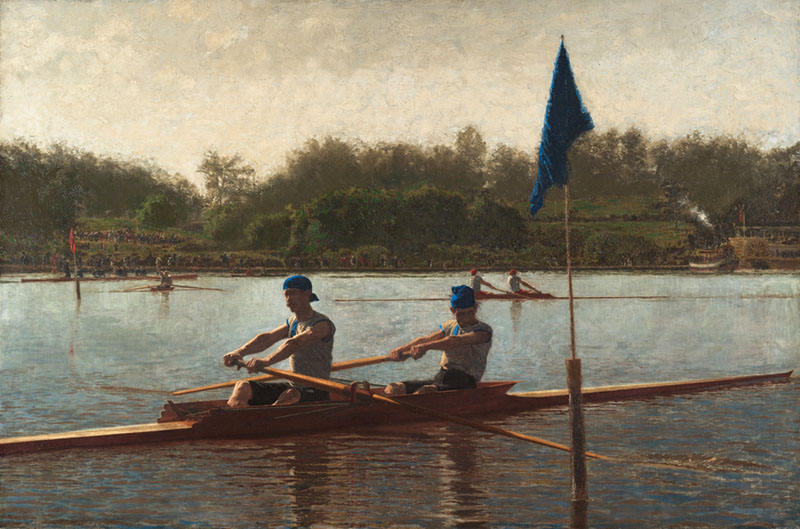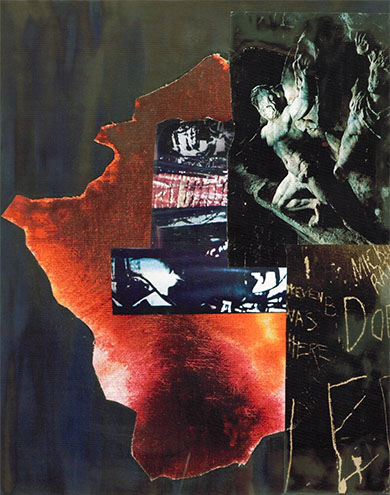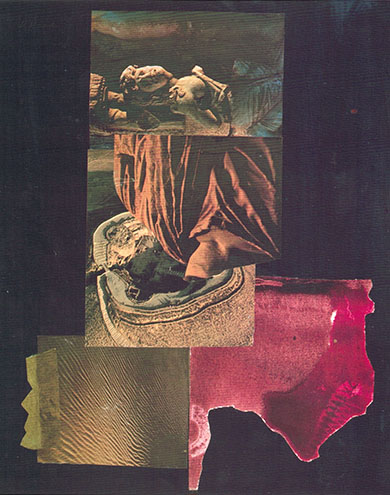Poems

Oarsmen on the Schuylkill
— The Biglin Brothers Turning at the Stake, Thomas Eakins, oil on canvas, 1873
Thomas Eakins rides the Schuylkill Falls
downstream where sculls beat teams
and scarlet-purple flags triumph.
He would not battle the youthful
crew, nor would he set brush to scrape
the rapid wake of broken wharfs
as the majestic river rises harried
by the ocean wind. He paints the sculling
run, the heads of men, muscles taut
pounding their oars into angry
waves to speed by boats,
houses banked against the river,
Fairmount Park, and the museum
of Eakins' fame. How the light glistens
on the river, as sculls merge
with sky, water, shimmering gold
to surface brief moments when the sun
withdraws, muting its power to reveal.

Sources
— Dorothy Hood, collage with multi-media, 1987
I
Scrawled graffiti-scrapped
letters, words on cave walls
the mind acts on the world,
creating figures—
muscular gods that strain to
kneel and stretch upright,
flayed canvas of light
and dark crimson splotches
the imagination molds
against a black base.
II
Hood taps on feelings.
She shapes a self that
shrinks and expands
intuition, and the unconscious
to imagine new forms
as we evolve. Sources
is in motion from antiquity
through the ages to the present
and beyond. The jagged edges
and color variations of the dominant
crimson figure reflect this generation
of emerging stages of evolution.
Death and Eros
— Dorothy Hood, collage with multi-media, 1987
I
Two sculpted heads, a warrior,
a noble woman. Eyes closed,
heads abutting a fallen column encased
in darkness with muted gold
and green highlights. The woman's head rests
on the neck of her lover. A terracotta
pleated fabric penetrates an ancient
urn gaped at the top, red splotches
against a sliver of shimmering gold.
II
Death and Eros test limits.
Eros demands the extremes of sensual
feelings. Death is the sharp end to both,
intense in its non-intensity.

The Front Window
looks over a circle
of peonies just beyond
the edge of the porch
where my grandmother
sat. As a teenager
I'd visit, and she'd look
at me and tell me
of the redness and deep
yellow of her special
flowers. We'd sit and look
together out of that window
until she would pour tea
into two thin china cups,
two cups on a small table
next to her chair,
where she sat for hours.
Her knobbed, wrinkled fingers
rubbed slowly along the surface
of the cups. Hiding
her blindness, she stared
in my direction and poured,
feeling the hot liquid rise,
then spooned honey
into each cup.

Laurence Tancredi is a psychiatrist-lawyer who has been a professor at New York University and the University of Texas. He attended many Bread Loaf conferences on poetry as well as a semester at the Vermont College of Fine Arts and sessions at Warren Wilson College. In addition to writing poetry, he practices psychiatry in Manhattan.

